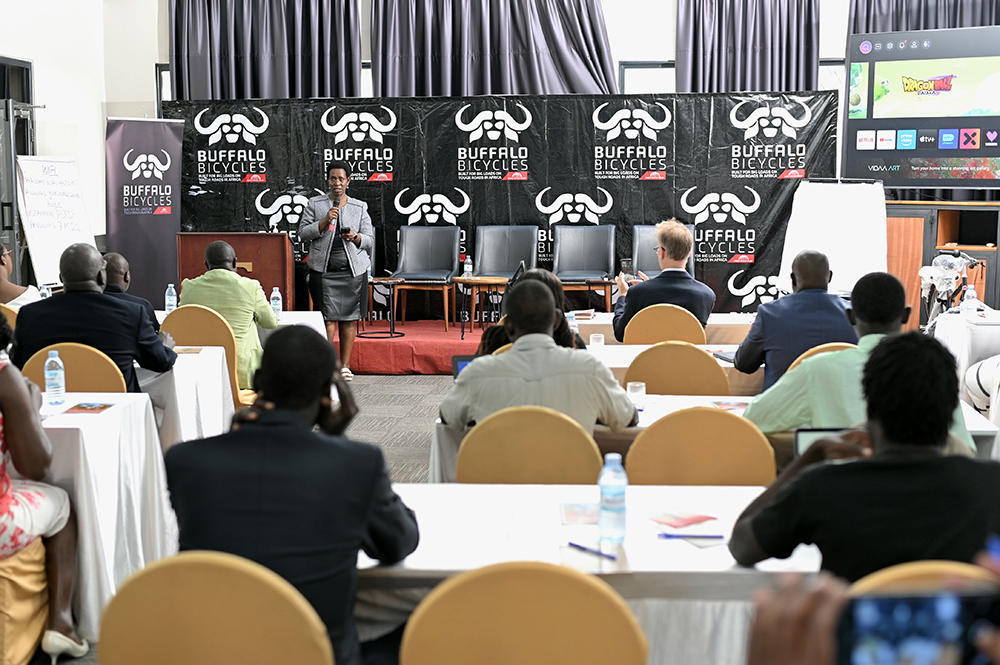Bicycles revolutionising rural health in Uganda
“With a bicycle, I can reach more homes in a day and respond faster when a mother is in labour,” Sarah A, a community health extension worker (CHEW) in Mayuge, said.
Over the past year; 331 Community Health Extension Workers (CHEWs) across the Lira and Mayuge districts were equipped with Buffalo Bicycles—rugged; purpose-built bikes designed for rough terrain. (Courtesy photos)
________________
In Uganda’s rural districts, where health centres are far apart and roads are often impassable, the bicycle is bridging the healthcare gap.
A new initiative distributing rugged, purpose-built bicycles to community health workers has dramatically expanded access to care, according to a report unveiled during the Pedal for Change Forum at Fairway Hotel in Kampala city on May 21, 2025.
In rural Uganda, healthcare access has long been defined by distance. For many, the nearest clinic is miles away, reachable only on foot or by costly transport. But the new initiative is reshaping that reality.
At the Pedal for Change Forum, World Bicycle Relief, operating through its local arm, Buffalo Bicycles Uganda, unveiled a new report in partnership with the health ministry. Titled Accelerating Health Access: How Buffalo Bicycles Empower CHEWs in Uganda, the report paints a picture of how simple, reliable transportation is transforming healthcare delivery.
A lifeline for last-mile care
However, behind the statistics are stories of resilience and renewed purpose.
“With a bicycle, I can reach more homes in a day and respond faster when a mother is in labour,” Sarah A, a community health extension worker (CHEW) in Mayuge, said. “Before, I walked for hours. Now, I ride—and I save lives.”
Ministry permanent secretary Dr Diana Atwine, who was also the chief guest at the forum, praised the programme as a cost-effective solution to Africa’s healthcare worker shortage. “CHEWs could save up to two million lives annually globally".
She cited the Global Strategy on Human Resources for Health. “Every $1 invested yields a $10 return in health savings. These bicycles aren’t just transport—they are enablers.”
“The continent needs 6.1 million more health workers by 2030 to achieve universal health coverage,” she said, citing the Global Strategy on Human Resources for Health. “CHEWs could save up to 2 million lives annually. They are not just filling gaps—they are redefining the frontline of care.”
Atwine called the bicycle programme a cost-effective investment with high returns: “Every dollar spent yields tenfold in health improvements. These bikes are more than transport—they are tools for reducing maternal and infant mortality, improving hygiene, and increasing immunisation coverage.”
Dr. Diana Atwine, the Permanent Secretary of Uganda’s Ministry of Health who was also the chief guest at the forum praised the programme as a cost-effective solution to Africa’s healthcare worker shortage.
Over the past year, 331 CHEWs across the districts of Lira and Mayuge were equipped with Buffalo Bicycles—rugged, purpose-built bikes designed for rough terrain. The results? Striking improvements in community health outcomes and worker efficiency.
- CHEWs doubled their weekly household visits, boosting outreach by 108%.
- Travel times to clinics dropped by nearly half, cutting delays in care by 47%.
- 71% used their bicycles to transport patients, dubbing their bikes “village ambulances.”
- Coverage radius expanded by 68%, bringing care to hard-to-reach communities.
- Transport costs fell by 61%, allowing workers to redirect funds to essentials like food and education.
Scaling up amid challenges
While the results are promising, challenges remain. Some health workers noted persistent gaps in medical supplies, and advocates stress that bicycles alone cannot replace systemic investments in clinics or training.
However, the model aligns with Uganda’s national CHEW expansion plans and mirrors successes elsewhere; a 2024 trial in Zambia saw bicycles boost healthcare access by 36 percentage points.
Dave Neiswander, the CEO of World Bicycle Relief, echoed the sentiment: “Mobility is not a luxury in healthcare; it is a lifeline. With Buffalo Bicycles, health workers can reach more people, respond faster, and deliver better care. This is what last-mile health equity looks like.”
The bicycles, supplied by World Bicycle Relief (operating as Buffalo Bicycles Uganda), are designed for rugged terrain. CHEWs report using them to expedite immunisations, maternal care, and emergency responses.
“They call them ‘village ambulances,’” said Neiswander. “Mobility is a lifeline in healthcare.”
As Uganda prepares to scale its CHEW programme nationally, World Bicycle Relief is urging governments and donors to prioritize mobility in health investments.
“This is not just about bikes,” said Dr. Atwine. “It’s about dignity, access, and equity. We have trained more CHEWs who are ready to serve—what they need now is the means to move.”
About World Bicycle Relief
Founded in 2005, World Bicycle Relief has distributed more than 891,000 bicycles globally, empowering communities with access to healthcare, education, and economic opportunity—one pedal stroke at a time.